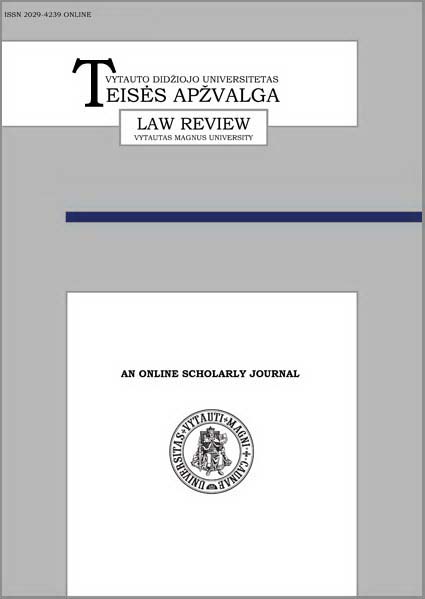LR BK įtvirtintos seksualinio priekabiavimo veikos teisinio reguliavimo Lietuvoje atitiktis ultima ratio principui
Compliance of the Offence of Sexual Harassment Legal Regulation with the Principle of ultima ratio
Author(s): Ugnė UrbšytėSubject(s): Law, Constitution, Jurisprudence, Criminal Law, Criminology, Studies in violence and power
Published by: Vytauto Didžiojo Universitetas
Keywords: Sexual harassment; Criminal liability; Ultima ratio principle; Quantitative research;
Summary/Abstract: According to a study by the EU Agency for Fundamental Rights, it is estimated that between 45 percent and 55 percent of women in all EU Member States have experienced sexual harassment. Despite the fact that the act of sexual harassment has been criminalized in the Criminal Code of the Republic of Lithuania for a long time, the case law in criminal cases of sexual harassment is extremely poor. As sexual harassment is subject not only to criminal but also to other types of liability, after criminalizing vulgar or vulgar-like actions, suggestions or even hints, there is a need to investigate whether the legal regulation of the offence of sexual harassment enshrined in the criminal code of the Republic of Lithuania contradict the principle of ultima ratio? The aim of this study is to perform a systematic analysis of the compliance of the legal regulation of sexual harassment in Lithuania with the requirements of the ultima ratio principle using quantitative research and examples of legal regulation of sexual harassment in selected foreign countries. The object of the research is the regulation of sexual harassment by the norms of Lithuanian criminal law and their practical application. Based on the results obtained during the research, it was established that the legal regulation of the sexual harassment act enshrined in the criminal code of the Republic of Lithuania contradicts the principle of ultima ratio. The results of the study revealed that: 1. The lack of legal protection measures in the fight against sexual harassment led to slower development and difficult integration of women into the labor market as well as stereotypical attitudes harmful to both men and women; 2. assessing the results of a quantitative study in the context of the criterion of criminalization, which means that the criminal offense must be perceived as criminal by the majority, it should be established that one-off or insufficiently intensive acts should be subject to civil liability; 3. the obvious sexual nature of an act of sexual harassment determines that this criminal offense is classified as an offense of a sexual nature. It has been established that the criminalization of sexual harassment limitation to physical acts of harassment does not provide sufficient and effective protection against other forms of intense sexual harassment; 4. having established that sexual harassment is a widespread behavior that violates the inherent values protected by EU legislation and the Constitution of the Republic of Lithuania, causing both short-term and long-term consequences and manifested in an environment where there is a relationship of dependency, substantially complicating the victim's ability to confront a harasser seeking sexual communication or satisfaction, it must be stated that sexual harassment is a dangerous act, the prevention of which requires the use of criminal law measures; 5. it has been found that the terms 'similar' and 'allusive' in the definition of an act of sexual harassment prevent a genuinely dangerous act from being distinguished from acts which should not fall within the scope of criminal law. The existing legal basis for initiating criminal proceedings solely on the basis of abstract hints or actions, which are not even considered vulgar, creates a situation when the actions of the accused formally appear in the list of actions criminalized in the Criminal code, they are insufficient to judge the accused’s desire for sexual intercourse or satisfaction.
Journal: Teisės apžvalga
- Issue Year: 2020
- Issue No: 2(22)
- Page Range: 74-105
- Page Count: 32
- Language: Lithuanian

